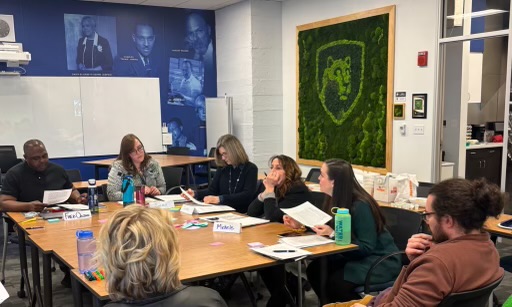 In late March, the Readiness Institute team was joined by the Holocaust, Genocide and Human Rights Education Initiative (HGHREI) at Penn State to host an informative and inspiring workshop for educators about “Framing Difficult Issues to Support K-12 Classroom Discussion.” The event was held at the Franco Harris Pittsburgh Center at Penn State and brought together a diverse group of attendees, including representatives from the Readiness Institute, Schools That Can, The Consortium for Public Education, and local school districts. More than 100 schools will be impacted through this conversation!
In late March, the Readiness Institute team was joined by the Holocaust, Genocide and Human Rights Education Initiative (HGHREI) at Penn State to host an informative and inspiring workshop for educators about “Framing Difficult Issues to Support K-12 Classroom Discussion.” The event was held at the Franco Harris Pittsburgh Center at Penn State and brought together a diverse group of attendees, including representatives from the Readiness Institute, Schools That Can, The Consortium for Public Education, and local school districts. More than 100 schools will be impacted through this conversation!
The workshop aimed to provide participants with a comprehensive understanding of navigating challenging conversations in educational settings. The agenda was structured to achieve two primary goals:
- Equipping teachers and staff with tools, strategies, and considerations for facilitating constructive dialogues on complex topics within classrooms and programs
- Introducing the HGHREI and its common activities and protocols, offering a glimpse into the full program’s offerings
The day kicked off with an engaging icebreaker activity to foster a sense of community among attendees and went on to include activities such as affinity mapping, interactive discussions about “leaning in” versus “leaning away” from difficult conversations, in-depth analyses of articles and case studies, and practical strategies and tools to prepare for challenging topics. Throughout the day, participants identified and shared the issues they encounter in their respective contexts of education and programming.
One of the articles that sparked a lively discussion and critical reflection was authored by Boaz Dvir (director of the HGHREI and assistant professor of journalism at Penn State), titled “How parents should engage kids in conversation on difficult issues such as the Israel-Hamas War.”
As the workshop ended, participants left with a renewed sense of confidence and empowerment to tackle difficult issues in their educational environments. The event not only provided practical strategies and tools but also fostered a supportive community committed to cultivating an asset-based lens in K-12 classroom discussions.
